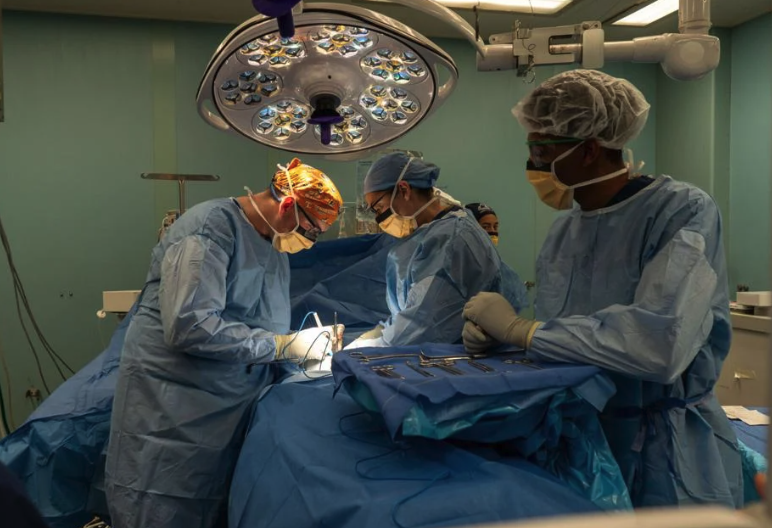Louisiana ‘ahead of the game’ on Medicaid overhaul, but funding challenges loom
Published 11:32 am Tuesday, July 29, 2025

- Lt. Cmdr. Yarrow Sheldon (left), assigned to the Mercy-class hospital ship USNS Comfort (TAH-20), performs a hernia repair surgery on a Dominican patient aboard Comfort off the coast of Puerto Plata, Dominican Republic during Continuing Promise 2025 on July 18, 2025. (Petty Officer 2nd Class Jonas Womac / U.S. Navy photo)
Rep. Stephanie Berault, R-Slidell, who sits on the House Health and Welfare Committee, says the state is well prepared to manage upcoming changes with Medicaid — although concerns remain about the burden of new work requirements and a looming loss of federal dollars.
“I don’t think it’s going to be as bad as all the panic seems to be,” Berault told The Center Square in an interview. “We’re going to have to make some adjustments and plan over time. I think it’s going to force us to speed up some technological improvements that we were going to make anyway.”
Roughly 400,000 people have lost Medicaid coverage in Louisiana since July 2023, when the state resumed eligibility checks that had been paused during the COVID-19 public health emergency.
That reduced Medicaid enrollment to about 1.6 million as of June — a 21% drop from the 2023 peak of 2 million, according to a report from the Louisiana Public Affairs Research Council, citing data from the Kaiser Family Foundation.
Much of the concern, Berault said, stems from fears that people could lose coverage due to administrative hurdles rather than ineligibility.
“It seems to me that a lot of the panic is around the fear that people will lose coverage because of paperwork issues, not necessarily because they lost eligibility,” Berault said. “We have the technology that we can implement… we’re just going to have to find a way to do it more quickly.”
Under recently passed federal legislation dubbed the “One Big Beautiful Bill,” Medicaid eligibility rules will tighten further. Most adult recipients will be required to work or participate in certain activities at least 80 hours per month by the end of 2026.
The law also mandates income verification every six months — a compliance challenge for lower-income residents, Berault noted.
“A lot of times, people who are already having low-income challenges, resource challenges — it’s compliance with having to deal with checking in and work requirements that is more difficult,” she said.
Berault expects that her “One Door” law will aid the state transition away from federal dependency. The law aims to streamline benefit access through a centralized system that connects the Louisiana Department of Health and Louisiana Workforce Commission.
“That has put us a little bit ahead of the game… the collaboration between workforce and LDH is already happening here,” Berault said. “There will be a dashboard… they will have a case manager through Louisiana Works who is going to be helping them manage all of their benefits.”
Under Berault’s law, Louisiana Department of Health will handle SNAP and Medicaid eligibility, “but it’s all going to be going through a centralized from the perspective of Louisiana residents needing services,” Berault said.
The federal Medicaid overhaul is also expected to impact the state’s budget in coming years, as Louisiana will be required to shoulder a greater share of costs currently covered through provider taxes — a financing mechanism that draws down additional federal matching dollars.
“That is a concern that we’re going to have to address during the budgeting process,” Berault said. “As the provider tax piece drops down, the state will be required to put up more… so we’re going to have to figure out where that money comes from.”
Of Louisiana’s $21.2 billion Medicaid budget, about $16 billion — or 75% — is currently funded by the federal government.
That reliance is partly due to Louisiana’s high poverty rate and its decision to expand Medicaid under the Affordable Care Act. As of 2025, about 32.8% of Louisiana residents are enrolled in the program, one of the highest rates in the country, according to the Kaiser Family Foundation.
Despite the disenrollment trend, Louisiana’s Medicaid budget continues to grow — driven by medical inflation and rate increases for providers — even as fewer people are covered.
Still, Berault remains optimistic that Louisiana’s proactive efforts to modernize its eligibility systems and coordinate agencies will help soften the blow of upcoming federal mandates.
“My hope is, and my expectation is, that fewer people will be missed than maybe the expectation is going to be — that there’s going to be a lot of people that lose their Medicaid just because they didn’t click the box, they didn’t get in and verify their income,” she said. “But if workforce is already communicating with LDH, then hopefully there’ll be a lot less of that.”

